
Why the Ph.D. program?
A Ph.D. program is not a study, it is a way to explore the world around you and create your future. As part of a Ph.D., you will gain the key skills needed to succeed in a dynamic world and have the opportunity to explore new perspectives and contribute to the technology revolution. International placements and participation in international conferences will open doors to the global research community. With the chance to participate in research and development of technologies with the potential to change the world, and the entrepreneurial opportunities that a Ph.D. study offers, you will become a creator of the future and a leader in your field. A Ph.D. at FEL UWB is an investment in your career and in exploring new possibilities in the world of modern technology.
Yes, doctoral studies are challenging. But in future employment, graduates with a Ph.D. degree are highly valued, especially abroad, because they have specific knowledge and skills that can only be acquired through work experience in research and development.
Why to study in Pilsen?
Studying for a Ph.D. at FEL in Pilsen offers unique benefits and opportunities for your personal and professional growth. One of the main factors is the individual approach to students, which is a fundamental feature of education at our Faculty. As a Ph.D. student, you are not just anonymous numbers for us, but you become part of our Departments and research teams, where you have the opportunity to fully participate in R&D activities and address current social science challenges. Flexibility in scheduling allows you to better combine your studies with other commitments.
Another advantage is the focus on topics close to practice, which reflects the needs of the modern world and offers the opportunity to collaborate with industrial partners. Thanks to a multidisciplinary approach and state-of-the-art laboratory facilities, future scientists have the opportunity to develop their knowledge in various areas of electrical engineering and contribute to innovation.
A Ph.D. program is both a challenge and a choice to be part of the change.
Building, testing, and pushing not only my limits
I am Zdeněk, and I design, build, and test electric motors as part of my Ph.D. I mainly deal with the design of multiphase machines. I see a future in these machines due to better characteristics such as efficiency, higher power density, and reliability. These characteristics make these motors suitable for use not only in electric mobility.
I have built several prototype motors on which we have tested the new findings, and these have been further applied for use on small electric motorcycles. Our team is working on the development of all-electric propulsion. This allows me to develop not only the motor but also the other components, especially the power converter, the battery, and the optimization of the control system.
I am currently designing the electric motor within the project "Electric Mobile Platform" in cooperation with the industrial partner Hennlich Ltd. Due to its size, this motor is also suitable for the emerging electric motocross bike project known as E-MXM.

Electric machines are also there where you don't expect them, and that's why they never cease to amuse me. Their applications range from mobile phones to large generators in the energy sector. You can find them in transportation vehicles, from the wiper in an internal combustion car to an electric car.
I'm building, testing and pushing more than just my limits.
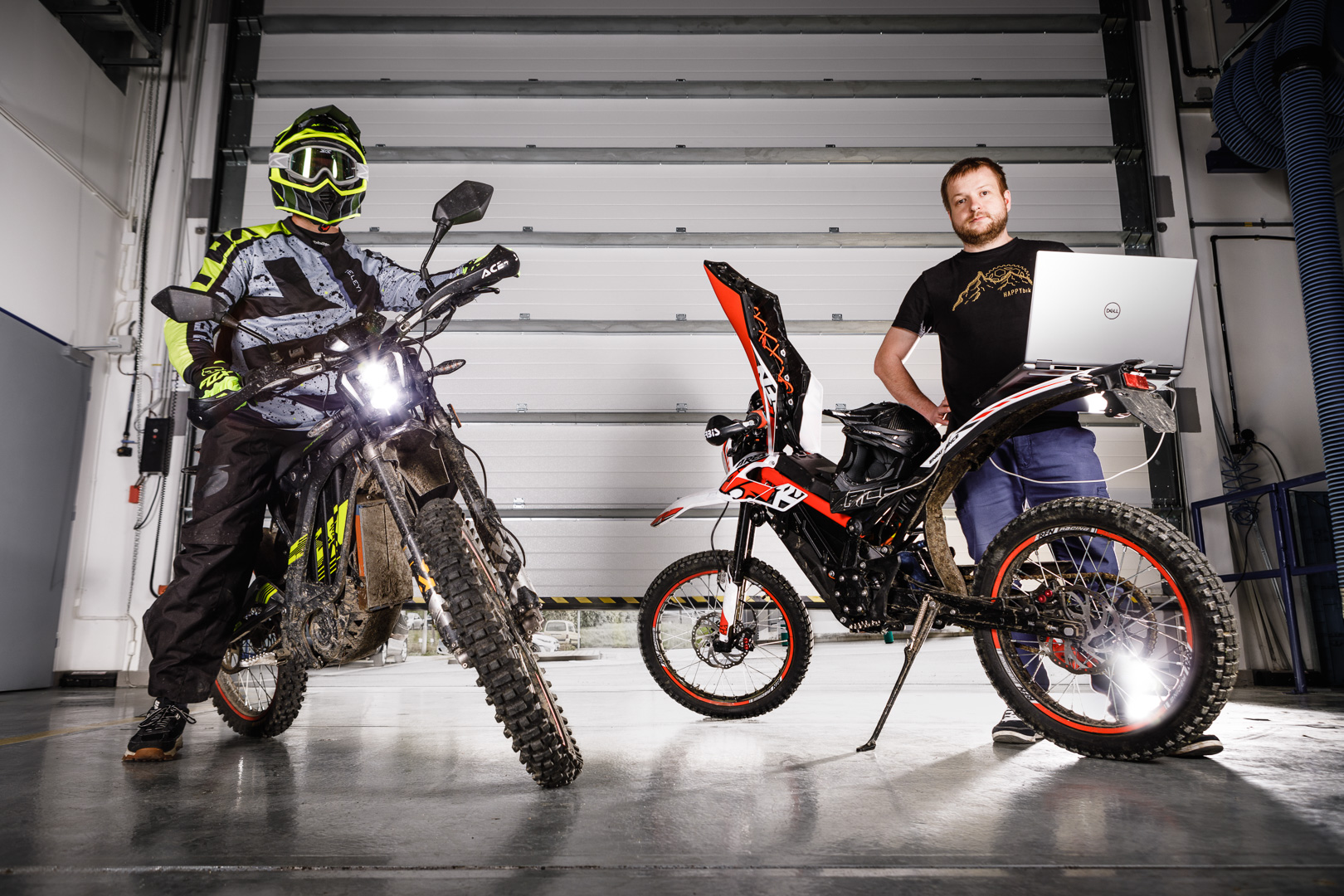
Write your own R&D story. Start with Ph.D. degree at FEL UWB.
Everything you need to know about the Ph.D. program admission procedure.
From smart textiles to computed tomography
Meet us, we are Míša and Pavel, third-year Ph.D. students at the Department of Materials and Technology. Each of us is working in a different field, but you'll still often see us together. Now we don't mean our shared office and sitting in pubs, but working together on different projects. I have been working on smart textiles since my undergraduate studies, mostly textiles for monitoring limb swelling, while Pavel focuses on computed tomography and intermetallic layers. Sometimes it is necessary to join forces and look at, for example, the structure of knitted antennas.
Modeling the structure of an antenna that is knitted from hybrid conductive yarns is quite time-consuming, and even then it may not correspond to reality, which is why CT (computed tomography) is a great help. CT equipment can image all the layers, in this case, the conductive micro wires, that are found in the hybrid thread.
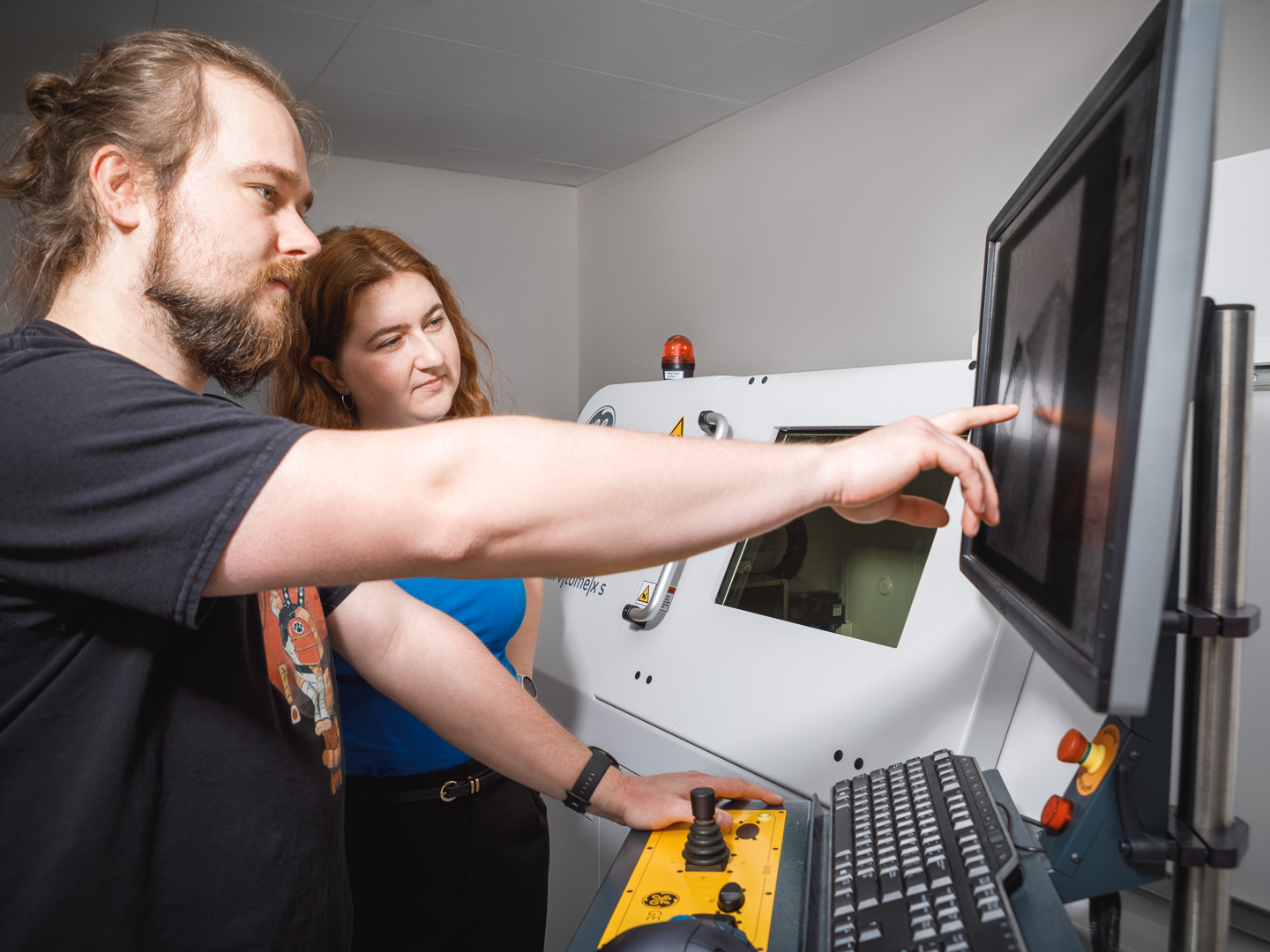
And why did we decide to do a Ph.D.? We were already involved in projects in the Department of Materials and Technology during our studies and found that there is a great group of people here. The fact that we choose an individual study plan for our Ph.D., we don't have a fixed schedule, we participate in projects we enjoy, and we are flexible in terms of time were other positive points for our decision.
Is doctoral study challenging? What you make of it is what you get!
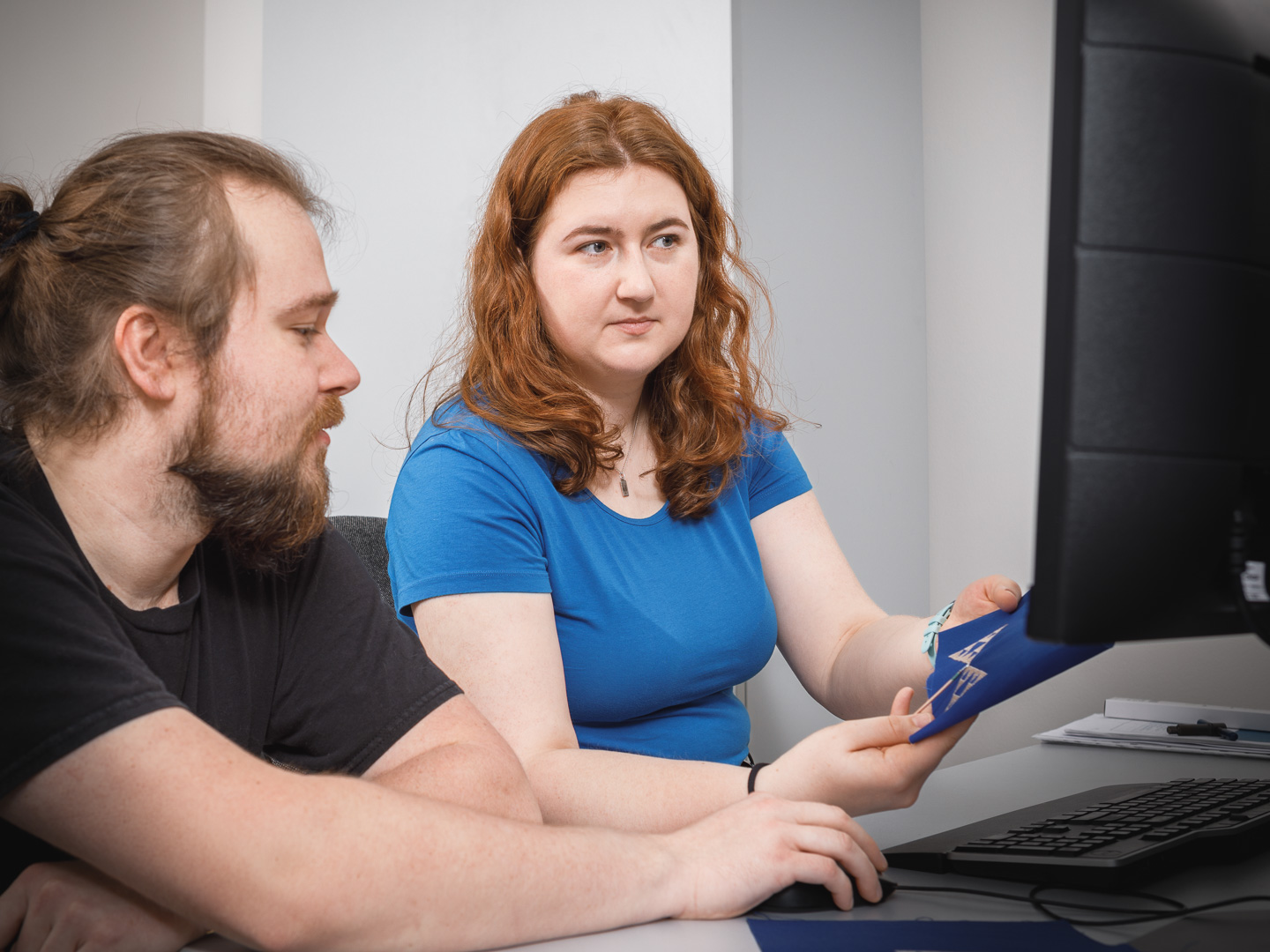
Turn your ideas into reality at FEL UWB.
Everything you need to know about the Ph.D. program admission procedure.
Innovating the future of grippers and pumps
"My name is Ondrej, and I am pursuing my Ph.D. degree at FEL UWB.
The field of research and development of magnetic elastomer grippers and pumps is almost limitless. We are dedicated to developing nature-inspired grippers for their natural selection of ideal shapes such as a bird's beak or a snake's head. The grippers are then used to grasp objects ranging from small and fragile to large.
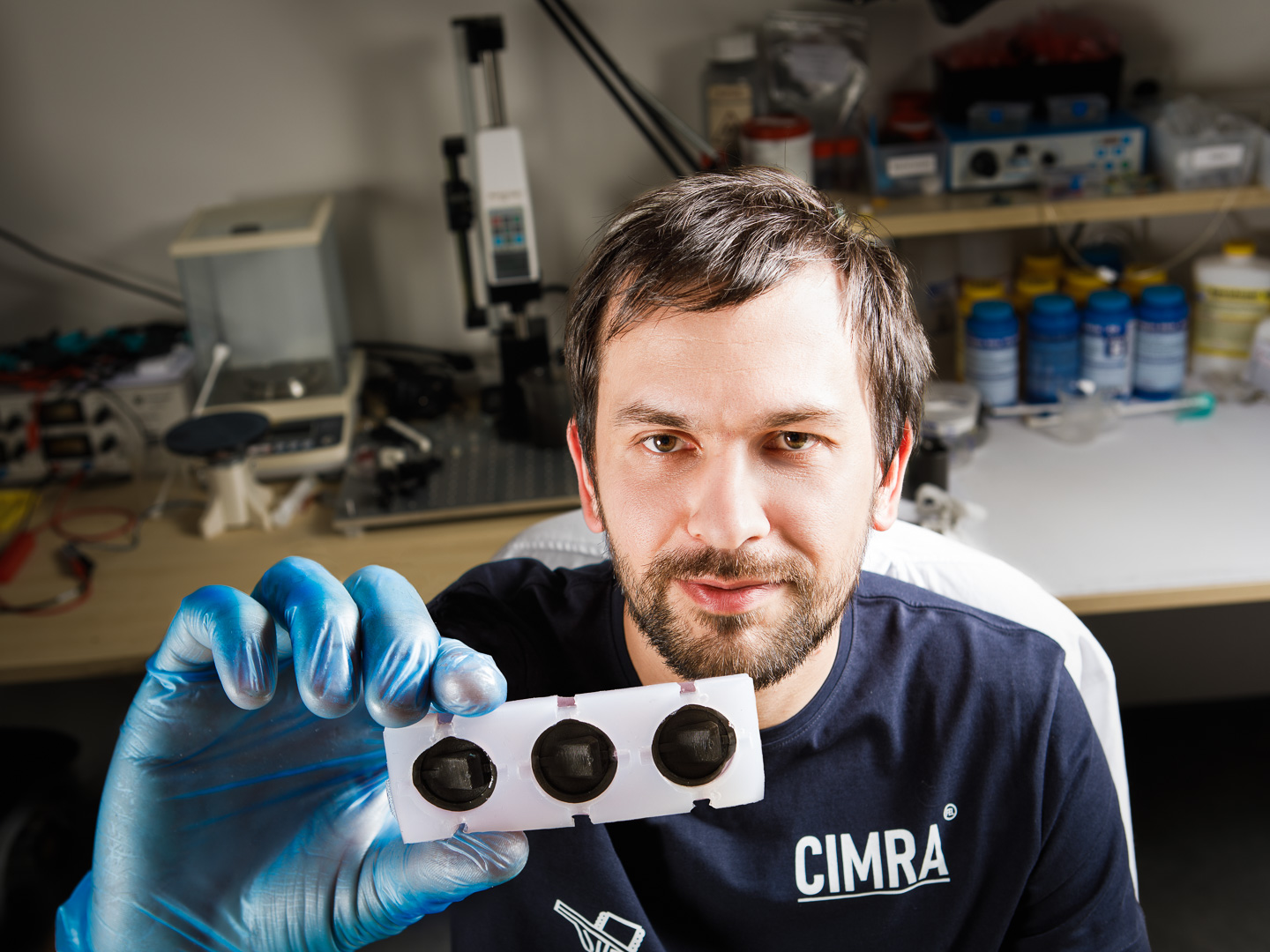
Micro pumps are then based primarily on peristaltic phenomena and can also take on different shapes. These micro-pumps have a major advantage in their precision. Due to their small size and minimal movement, they pump small volumes but with high precision, which can be used, for example, in medicine or space technology.
The material of both can be adjusted by adjusting the material composition and achieving a wide range of properties that can be combined with each other. These properties include, for example, material stiffness, magnetic strength, magnetization or even surface treatments or material colour."
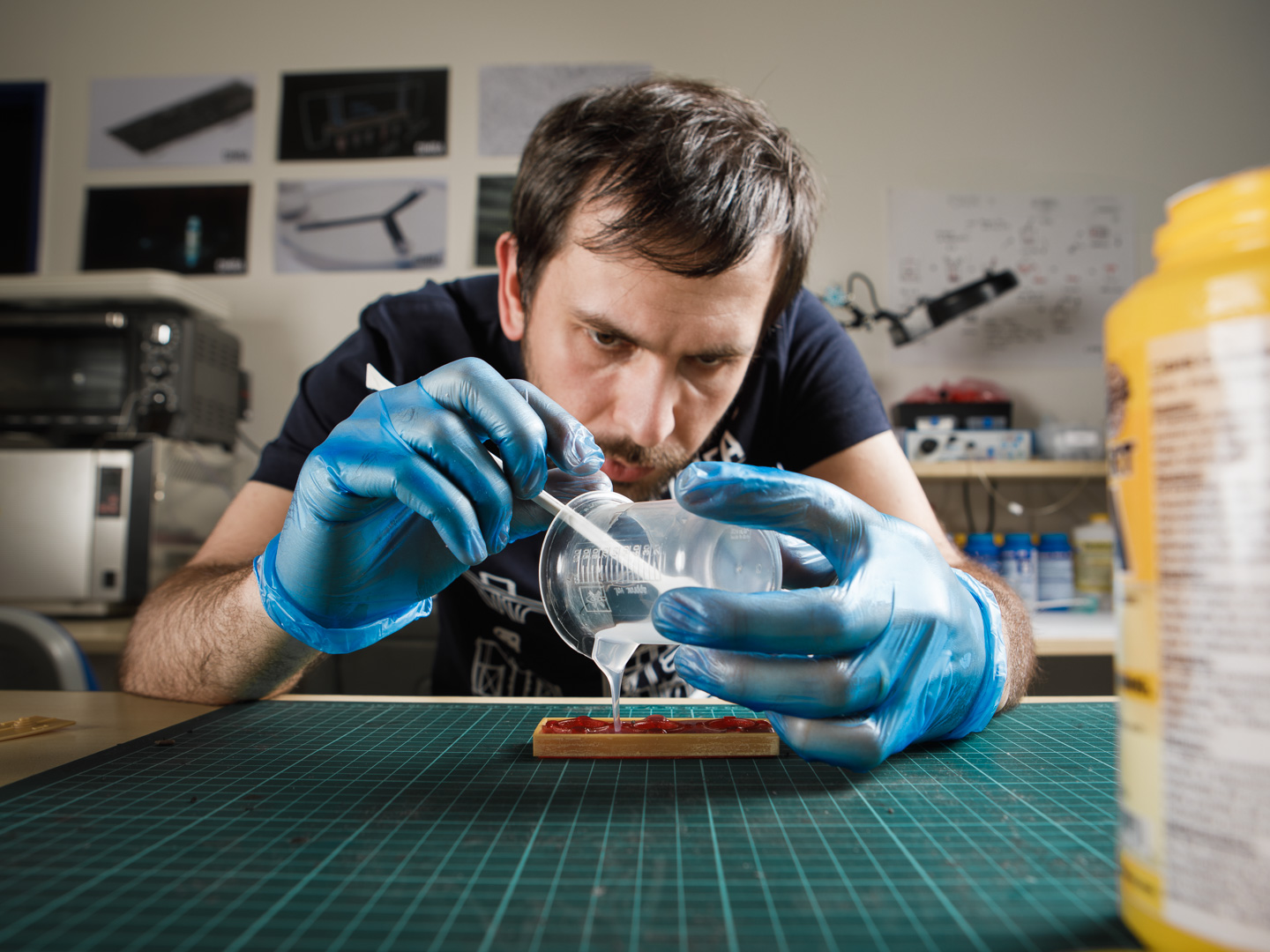
Be part of the future of science - apply for a Ph.D. at FEL UWB.
Everything you need to know about the Ph.D. program admission procedure.
I am a Ph.D. student
and a "Start-upist"
“My name is Martin. My doctorate from the Faculty of Electrical Engineering enabled me to pursue precisely what I love professionally, alongside people who have become my closest friends. I couldn't have wished for anything better in my professional life. As a bonus, I had the opportunity to visit countries such as Canada, the USA, Germany, or Finland through scientific conferences and internships, largely thanks to my supervisor. It's important to realize that by choosing a supervisor, you're also choosing your closest colleague and boss, which is a very unique opportunity to reach for the best in your surroundings.
It's still about studying (although in a slightly different form), and it's up to each individual how they approach it. Besides the study itself and working on the dissertation, the doctorate offers much more. In my case, it was the opportunity to participate in a series of interesting projects that weren't directly related to my dissertation but significantly propelled me forward, not only professionally.
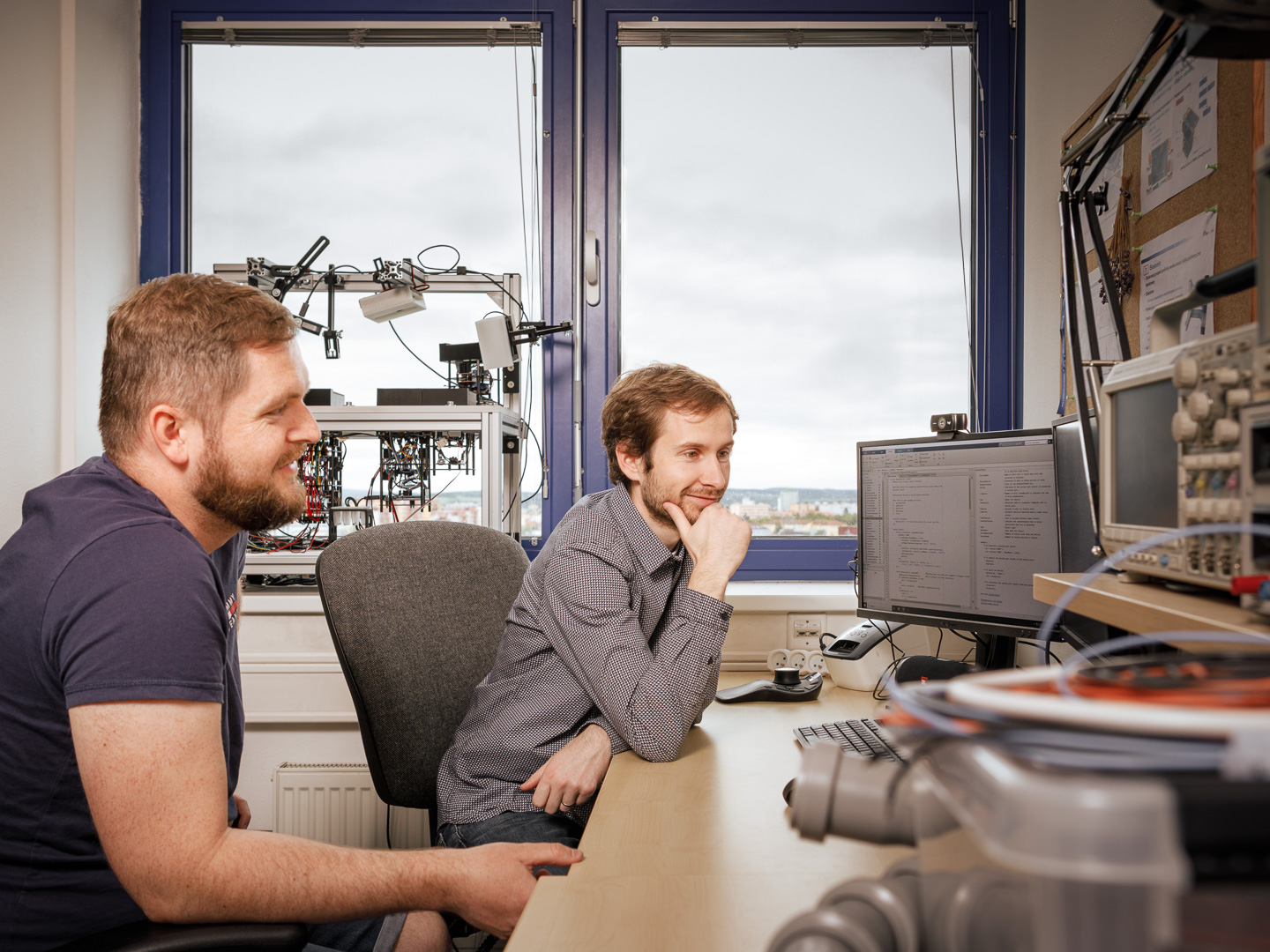
It took, and still takes, a lot of time and effort, but I don't regret a single minute. I've learned much more than my previous studies offered. An engineering degree is just the beginning, and the continuation is much more fascinating.
In our research group CIMRA, each of us has assigned tasks, and we complement each other in building various machines. We focus on industrial applications, so our work doesn't end up in a drawer but is actually used by thousands of people. Personally, I'm involved in the development of high-level software. Beyond our collaboration at school, my colleagues and I have founded a startup company called Nextdrop, where we strive to manage water resources better through automation and advanced algorithms. It's not an easy journey, but we're incredibly passionate about it."

Become an innovation leader - join us at FEL UWB.
Everything you need to know about the Ph.D. program admission procedure.
I create numerical models of electrical discharges
"Hi, my name is Filip. As part of my Ph.D. at Faculty of Electrical Engineering in Pilsen, I create physical models of macroscopic structures of electric discharges using numerical mathematics tools, programming languages, and computer servers.
Experimental research of discharge processes in the domain of high-voltage technology will indeed always remain a key component of any progress, as it provides unquestionable data on the behaviour of electrical discharges in any electrical device. In this respect, experimental research is like a strong, stable tree trunk whose roots come from the sudden evolutionary leap of our species in the sense of being able to imagine and then plan everyday activities instead of investing a lot of time and risking failure in real life.
Our ability to reconstruct real processes in the form of physical models using the apparatus of numerical mathematics is then an ever-growing offshoot of this strain of experimental research.
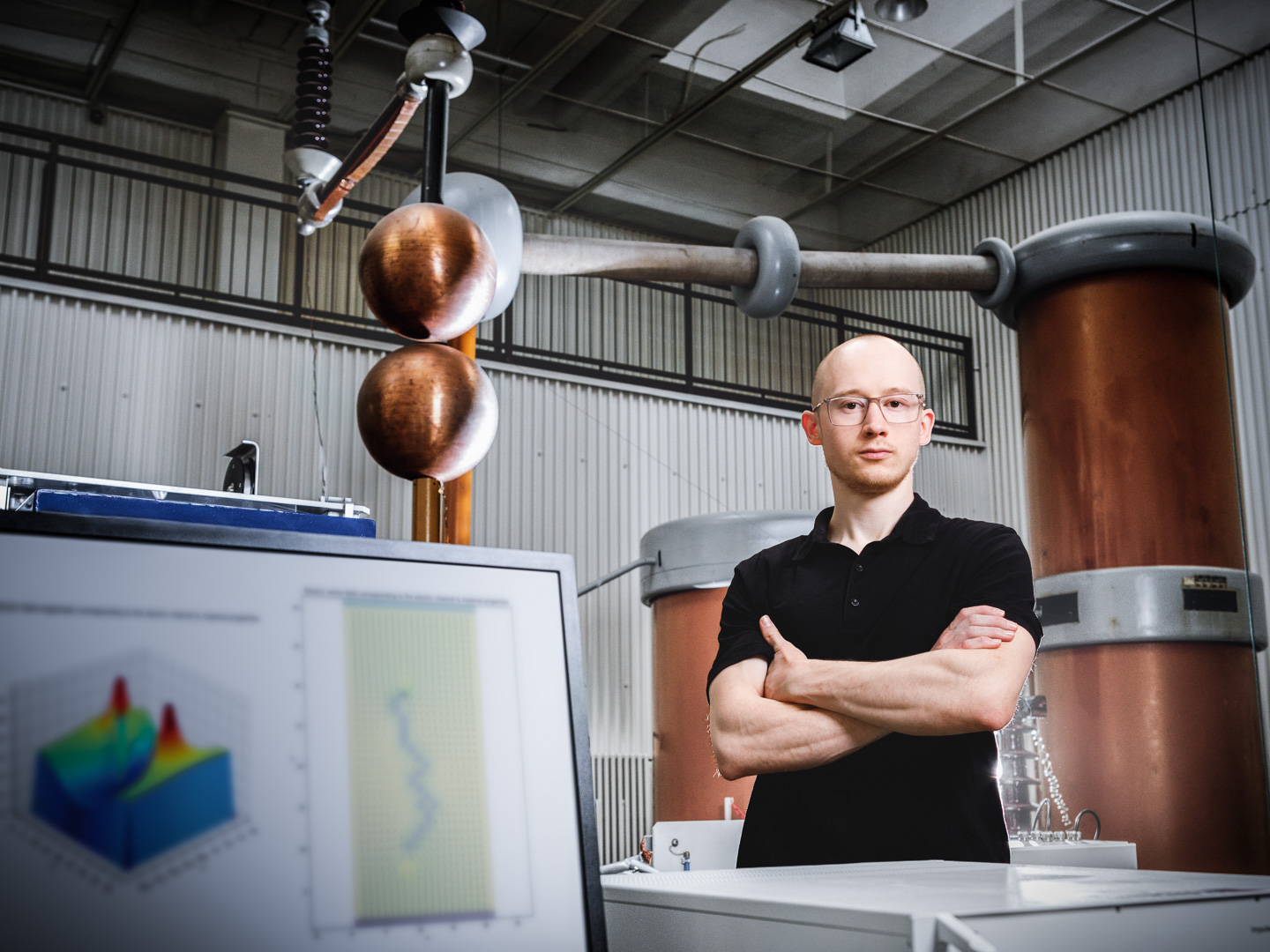
To use our latest computing machines to expand the spectrum and increase the power of our human imagination, and thus gain all the benefits of planning, we must first understand and then expand our physics behind the real processes we want to use in our lives or, in the case of electrical discharges in high-voltage technology, avoid.
This means that if we want to effectively protect our electrical devices from the destructive effects of plasma filaments in the form of electrical discharges and thus extend their lifetime, i.e., plan the design and operation of electrical devices, we must first understand, expand, and then effectively apply the physics in the domain of the behavior of matter under the influence of known physical fields, which includes, but is not limited to, electrical fields."
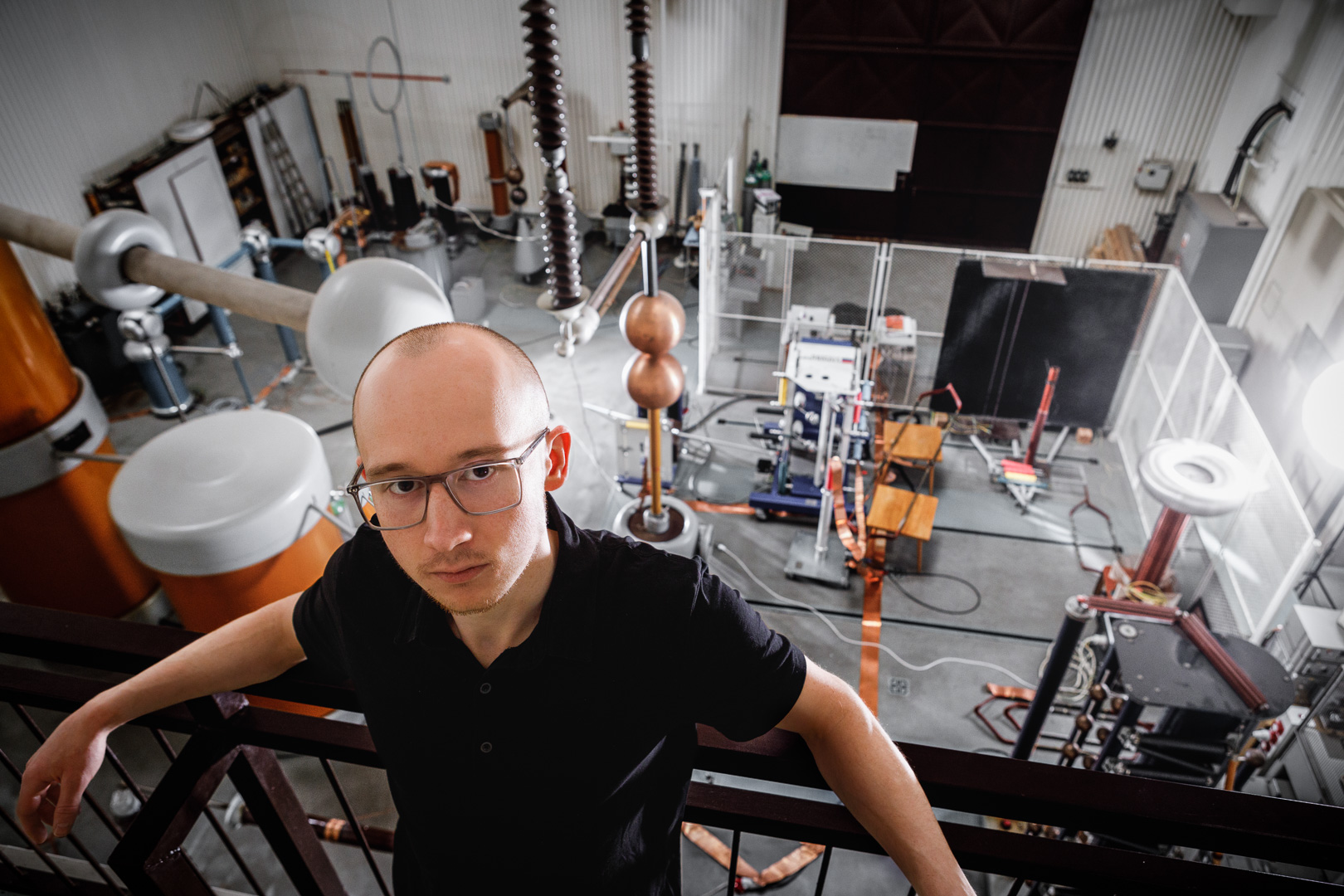
The courage to change the world starts with us. Be there!
Everything you need to know about the Ph.D. program admission procedure.
I collaborate with CERN on developing robust detector systems
"I'm Ondra, a doctoral student working in the physical instrumentation team. I focus primarily on electronics and hardware. A significant part of our work involves collaborating with CERN on complex projects in the field of high-energy physics measurements. Our electronics must endure extreme conditions, such as ionizing radiation and strong magnetic fields.
Currently, I am researching resilient power supplies, with the first version already operational in the detector system of the ATLAS experiment at CERN. Additionally, I am working on extensive detector systems with Timepix particle detectors.
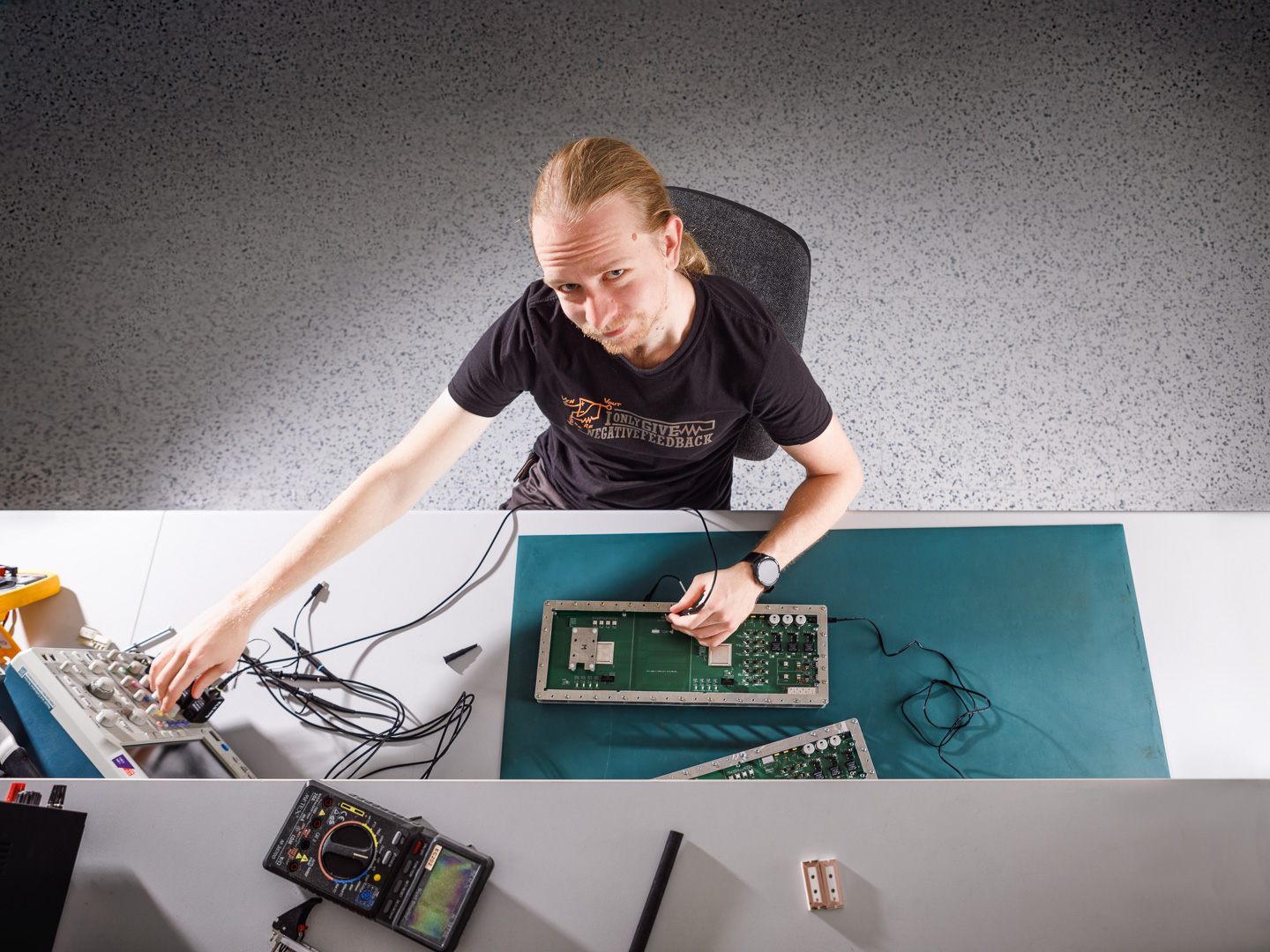
I have been involved in the study of resilient electronics since my master's degree, during which I tested the behavior of FPGA circuits in ionizing radiation environments. I also had the opportunity to test my hardware on particle beams at CERN and the Los Alamos National Laboratory, yielding very interesting results."
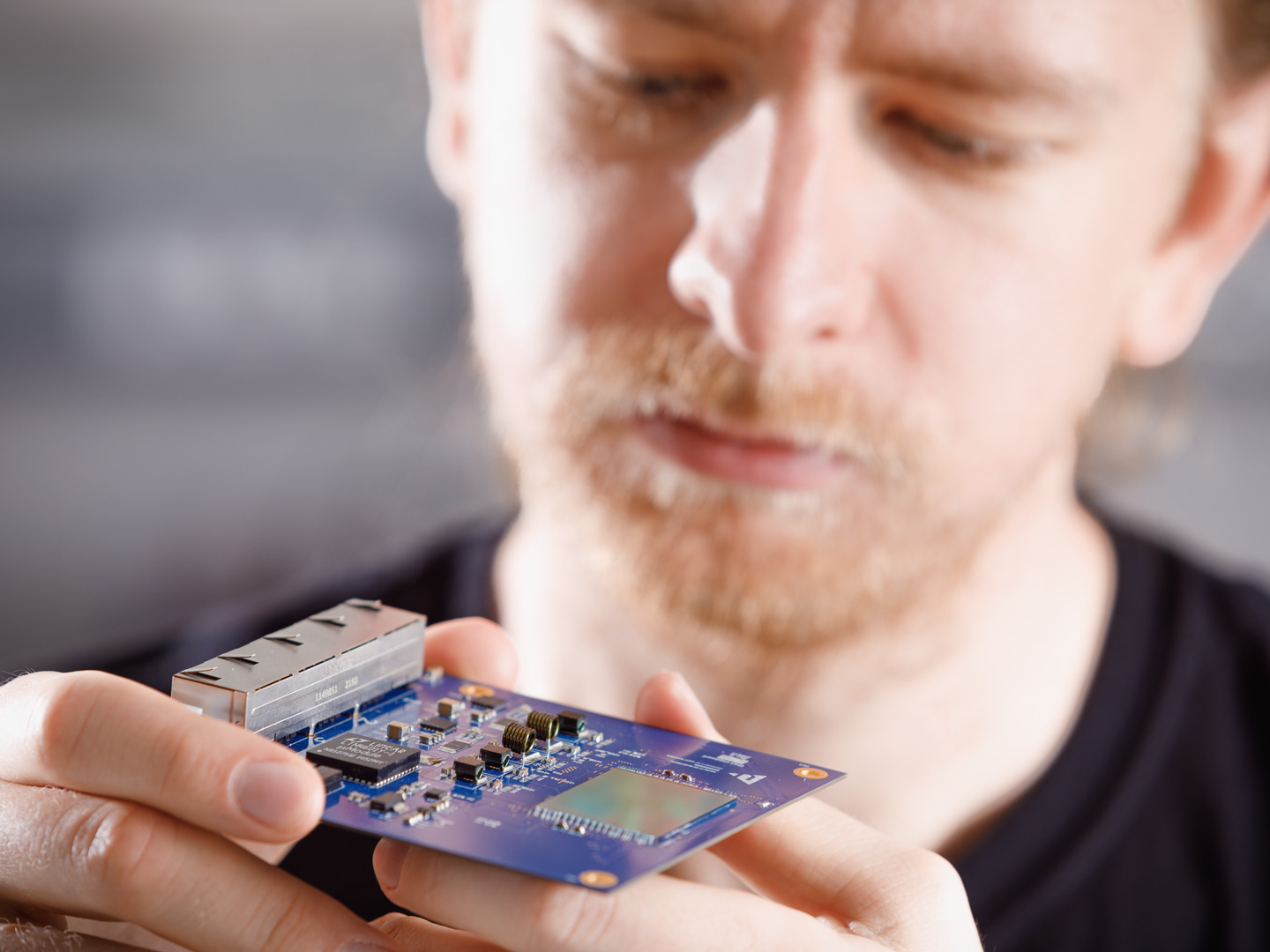
Join the elite of scientists in Pilsen and discover new possibilities.
Everything you need to know about the Ph.D. program admission procedure.